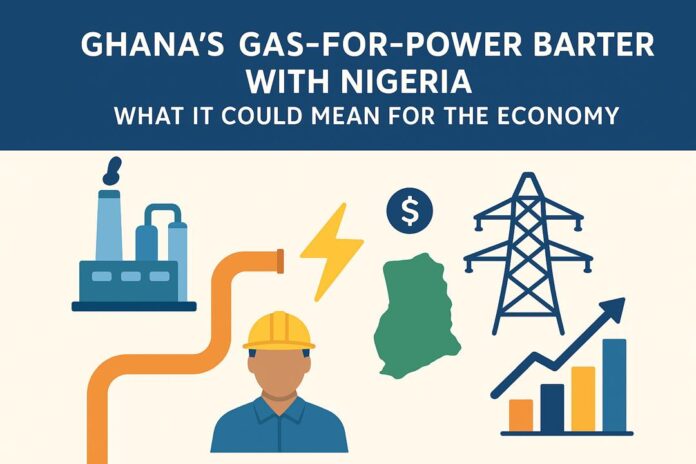Ghana’s Energy Ministry has recently hinted at an arrangement where Nigeria would supply natural gas to Ghana, which Ghana would then use to generate electricity. Instead of paying for the gas in cash, Ghana would export some of the electricity back to Nigeria and other neighbours as a form of barter trade.
This idea sounds unusual, but it fits into a bigger project called the West African Power Pool (WAPP), a regional program under the Economic Community of West African States (ECOWAS) that is building transmission lines to link the electricity grids of 14 countries. The goal is to simply to power cheaper and more reliable by sharing resources across borders with which Ghana is already a key part of this effort.
In this article, I explore how the deal could affect Ghana economy in terms of employment, foreign exchange, investor confidence, and infrastructural costs of the deal. We will also consider whether barter is the best choice compared to other options such as investing more in Ghana’s own gas processing or renewable energy.
Employment Benefits
The issue of employment is very critical in this analysis its one of the factors the everyday Ghanaian is concerned about. the unemployment rate in Ghana according to statista.com is estimated to be around 3.1% as at 2024. The question of the impact of the deal on employment lies in the gas and electricity value chain that is if more gas comes in through Nigeria’s West African Gas Pipeline (WAGP), a pipeline that already connects Nigeria to Ghana through Benin and Togo then to the Ghanaian thermal power plants in Takoradi and Tema can operate more consistently. Running these plants requires engineers, technicians, operators, and maintenance staff creating employment in the economy. When Ghana built its first gas processing plant at Atuabo, the Ministry of Finance estimated it created around 1,000 direct and indirect jobs. A similar scale of employment can be expected if Ghana expands its gas imports and generation activities creating an estimated number of 700–1,000 direct jobs in operations, plant expansion, and gas handling. Beyond that, new transmission lines which may be needed to export the power would employ construction workers, welders, electricians, and local suppliers which will create a similar indirect employment of 1,500 – 2000 workers. Adding together gas infrastructure and electricity transmission upgrades, the barter deal could create a total of 2,000–3,000 temporary construction jobs in Ghana. Also, reliable electricity supports factories, small businesses, and digital services. Studies by the African Development Bank show that every megawatt of stable electricity can support 50–70 indirect jobs in the economy therefore, if Ghana adds, say, 300 MW of new power for export and domestic use, that could mean 15,000–20,000 indirect jobs in manufacturing, services. In total, this plan could realistically support 3,000–4,000 direct and temporary jobs in the energy sector itself, and up to 15,000–20,000 indirect jobs across the wider economy.
Impact on the Cedi and Foreign Exchange
Foreign exchange is one of the biggest pressures on Ghana’s economy. Ghana usually pays for imported gas in U.S. dollars creating the demand for dollars, which pushes down the value of the cedi. Under a barter arrangement, Ghana would “pay” for the gas with electricity instead of dollars. That means fewer dollars leave the Bank of Ghana’s reserves, easing pressure on the cedi. Inasmuch as the deal could yield in easing pressure on the cedi, there is also a trade-off. Normally, when Ghana exports electricity say, to Benin or Togo, it earns cash revenue in dollars. If Ghana barters that electricity instead, it loses out on dollar inflows. So, while the barter relieves some pressure on the cedi, it could also limit Ghana’s ability to build up reserves. A carefully structured agreement between Ghana and Nigeria will. Be need to ensure reserves are not depleted.
Investor Confidence
Investors, whether foreign or local, want stability and rules they can trust before they conclude on decisonns to put their resources in a country. Fortunately, the ECOWAS energy sector has already created such rules which includes the West African Gas Pipeline Authority (WAGPA) that regulates the gas pipeline, while the ECOWAS Regional Electricity Regulatory Authority (ERERA) sets rules for cross-border electricity trade. These institutions require things like transparent tariffs, settlement guarantees, and dispute resolution mechanisms. For example, ERERA has a “securitization directive” that ensures payments in cross-border trade are backed by financial guarantees. This reduces the risk for private companies that may want to invest in power plants or transmission lines in Ghana.
By being at the forefront of these regional deals, Ghana strengthens its reputation as a reliable hub, making it more attractive for future investors.
Ghana as a Regional Leader
If this barter deal succeeds, Ghana will be seen as a leader in regional cooperation. In a region where electricity shortages are common. Nigeria, despite being rich in gas, often struggles with blackouts; Ghana can build diplomatic and economic capital by exporting reliable power. This leadership goes beyond prestige. It has practical benefits. By acting as a hub, Ghana can run its power plants at higher efficiency, spread out fixed costs, and negotiate better financing terms for new projects. It also positions Ghanaian companies to win contracts and supply deals across the region.
Potential Challenges that could be encountered with this trade deal includes;
The Infrastructure Challenge
While the pipeline and grid connections already exist, they may not be enough for larger-scale barter.
Gas side: The West African Gas Pipeline can currently deliver about 170 million standard cubic feet per day. With extra compressors, it could deliver nearly three times that amount. If Ghana wants to import more gas, such upgrades will be necessary. installing new compressor stations typically costs $50–100 million each, depending on size and location. If Ghana requires two new compressor stations, the bill could be $100–200 million.
Electricity side: Ghana already has 161 kilovolt (kV) lines to Togo and Benin and a 225 kV line to Côte d’Ivoire. However, Nigeria’s major lines operate at 330 kV. To move big blocks of power eastward, new 330 kV lines across Togo and Benin would be needed. World Bank documents show that each such line could cost between 150 and 300 million U.S. dollars, depending on distance and terrain.
System operations and metering: Cross-border trade requires advanced metering systems, settlement software, and control centres. These upgrades may cost another $20–50 million, often funded by development partners like the World Bank. Total estimated infrastructure cost: Between $450 million and $850 million over several years. For perspective, this is roughly the cost of building a medium-sized hydroelectric dam in Ghana. The cost of this infrastructure could potentially increase Ghana debt stock.
The Measurement Problem
One of the biggest challenges in a barter system is fairness. Gas is usually measured in million British thermal units (MMBtu) or million standard cubic feet (MMSCF), while electricity is measured in megawatt-hours (MWh). To swap fairly, both sides need to agree on a conversion rate: how much electricity one unit of gas produces. But this depends on the heat rate of the power plant (a measure of how efficiently it turns gas into power). A modern combined-cycle gas turbine can convert 7.5 MMBtu of gas into one MWh of power. If the plant runs less efficiently, more gas is needed. Without a clear formula, one side could end up feeling cheated. That is why accurate meters, transparent contracts, and periodic efficiency tests will be essential.
Should Ghana Barter or Invest Elsewhere?
Ghana’s proposal to barter electricity with Nigeria in exchange for natural gas has sparked debate about whether it is the best path forward for the country’s energy and economic future. On one hand, a barter arrangement offers short-term relief and strengthens regional cooperation. On the other, it comes with risks that could undermine Ghana’s long-term stability. The question, then, is whether Ghana should commit to this barter system or instead invest in its own domestic resources and alternative energy technologies.
One clear advantage of barter is its impact on Ghana’s foreign exchange reserves. Ghana typically pays for imported gas in U.S. dollars, which places pressure on the cedi and drains reserves. By paying with electricity instead, Ghana avoids spending hard currency, which helps stabilize the economy. Another benefit is that barter reduces the risk of late or unpaid bills from neighbouring countries. Since payment is made “in kind” with electricity, there is less room for financial disputes. Finally, barter strengthens regional integration. By actively participating in the West African Power Pool, Ghana would show leadership in cross-border trade and cooperation, which could attract further investments into the regional energy market.
Despite these advantages, barter is not without risks. The most immediate concern is the loss of dollar revenues. Normally, Ghana earns valuable foreign exchange by exporting electricity to neighbouring countries. In a barter deal, these cash inflows would be lost, limiting the country’s ability to build reserves. Another risk lies in the reliability of supply from Nigeria. Nigeria has a history of cutting gas exports during domestic shortages. If such interruptions occur, Ghana could find itself unable to both meet local power demand and honour its export commitments. Finally, measuring fairness in barter is complicated. Gas is measured in units of energy like British thermal units, while electricity is measured in megawatt-hours. The efficiency of Ghana’s power plants determines how much electricity can be generated from each unit of gas. Without clear and transparent formulas, one side could end up with more value than the other.
Because of these challenges, Ghana must consider whether alternative strategies would bring more sustainable benefits. One option is to process more of its own domestic gas. The Atuabo Gas Processing Plant is already expanding to double its capacity, and further investment could allow Ghana to use more of its own oil and gas resources instead of relying on imports from Nigeria. This would keep jobs and revenues within Ghana while strengthening energy security. Another promising option is renewable energy. The cost of solar and wind power has dropped sharply in Africa, making them competitive with thermal plants. If paired with batteries and stronger regional grid connections, renewables could provide Ghana with cleaner, cheaper, and more reliable energy in the long run. Finally, Ghana could focus on improving efficiency. A significant share of generated electricity is lost through inefficient transmission or theft. By upgrading power plants and reducing these losses, Ghana could add the equivalent of a new power plant’s capacity without actually building one saving both money and time.
Conclusion
In conclusion, barter offers Ghana some short-term economic relief and strengthens its regional role and leadership, but it also exposes the country to risks of lost revenues and unreliable supplies. The alternatives, expanding domestic gas processing, investing in renewable energy, and improving efficiency offer a more sustainable, long-term benefits. The best approach may not be an “either-or” decision but a balanced strategy: Ghana can pilot barter on a small scale to ease immediate pressures while investing more heavily in domestic and renewable energy solutions that secure its future independence.




